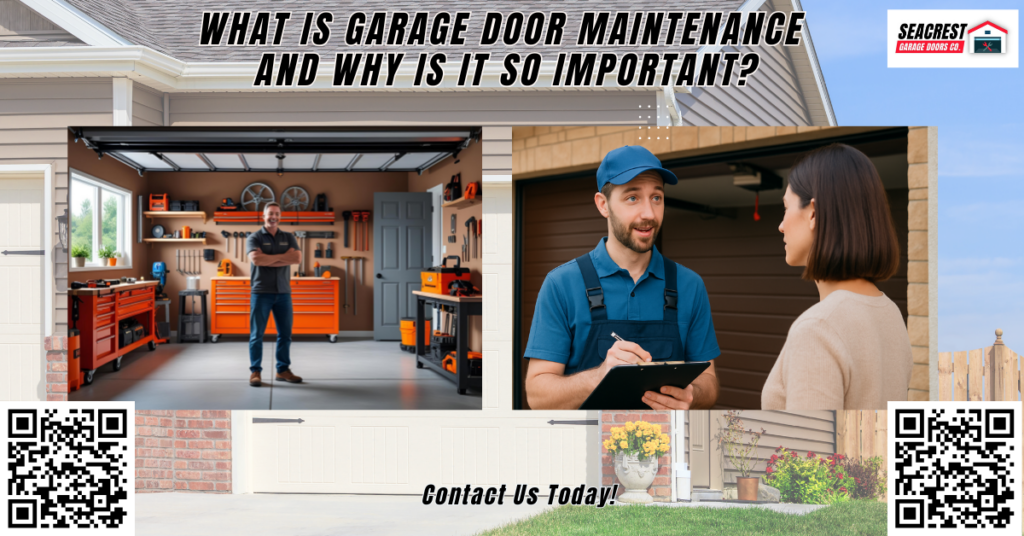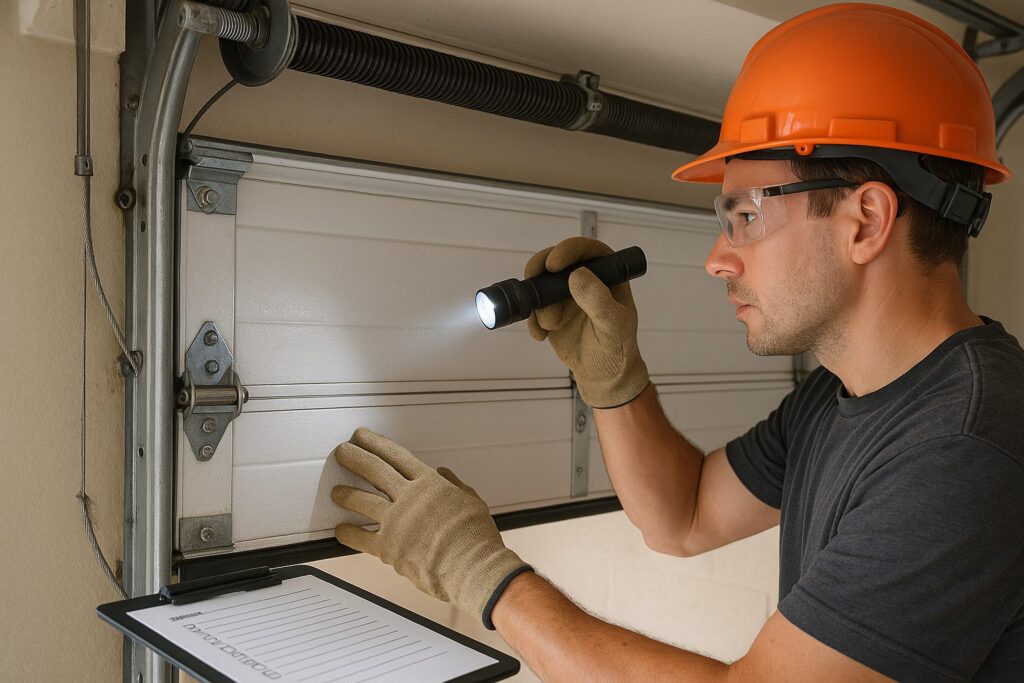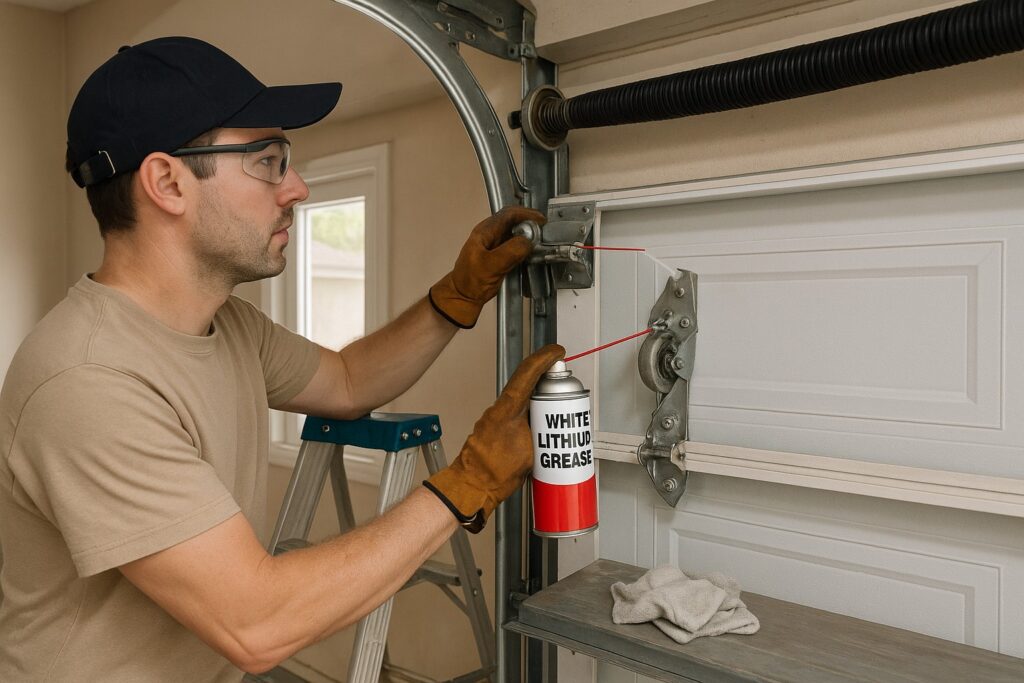What Is Garage Door Maintenance and Why Is It So Important?

It was a freezing winter morning in Lincoln, NE, when we received an urgent call from a homeowner whose garage door wouldn’t open. Trapped inside was her car, her kids in the backseat, and a ticking clock counting down to work and school obligations. The culprit? A broken torsion spring and a worn-out opener, both of which had been showing signs of trouble for months. With proper garage door maintenance, this entire ordeal could have been avoided.
According to the U.S. Consumer Product Safety Commission, over 20,000 injuries in the U.S. each year are related to garage doors. These accidents often result from neglected parts such as frayed cables, misaligned tracks, and malfunctioning safety sensors. This makes garage door maintenance not just a recommendation, but a critical step in safeguarding your home, your family, and your peace of mind.
At Seacrest Garage Doors Co., we emphasize the importance of regular maintenance for both residential and commercial garage doors. Proper garage door maintenance ensures safe operation, smooth functionality, and prolonged equipment life. In this guide, we break down the “what,” “why,” and “how” of garage door maintenance and explain how it impacts everything from safety to cost-efficiency.
What Is Garage Door Maintenance?
Garage door maintenance refers to the routine inspection, cleaning, lubrication, adjustment, and repair of your garage door system. This includes the door itself, the garage door opener, springs, tracks, rollers, hinges, sensors, cables, and all associated parts and features. This step-by-step guide helps detect early signs of wear, prevent breakdowns, and ensure smooth operation year-round.
A typical garage door system is made up of many moving parts: rollers, torsion springs, cables, arm bars, hinges, brackets, and tracks. Without regular maintenance, these metal parts accumulate dirt, grease, rust, and debris, which can cause mechanical failures or even physical injury.
Preventative maintenance involves:
- Lubricating garage door rollers, hinges, and springs with white lithium grease.
- Cleaning garage door tracks to remove dirt and hardened grease.
- Inspecting torsion springs for signs of corrosion or weakening.
- Tightening nuts, bolts, and roller brackets using a socket wrench.
- Ensure the auto-reverse safety feature and sensors are functional.
- Examining weather stripping and seals for water damage.

It also involves listening for abnormal sounds during door operation, checking for sagging or misaligned panels, and testing the garage door opener’s performance. With consistent maintenance, all the moving parts can work in harmony, ensuring your garage door delivers dependable service for years to come.
Why Is Garage Door Maintenance So Important?
1. Safety for You and Your Family
A garage door can weigh over 300 pounds. Without regular maintenance, a sudden failure in a spring or cable could cause the door to crash down. This can lead to serious injuries, particularly if pets, children, or vehicles are in the door’s path. Safety sensors, if misaligned or dirty, may fail to trigger the auto-reverse feature.
Maintenance tasks such as cleaning the photoelectric sensors, checking cable tension, and testing the emergency release handle reduce these risks and promote safety throughout your home. Proper maintenance ensures that all safety features are working as intended, including door openers with auto-reverse sensors and manual release mechanisms that allow you to operate the door safely in the event of a power outage.
2. Extending the Lifespan of Garage Door Components
Garage doors are opened and closed multiple times each day. Over time, this constant operation wears down the system. Roller brackets become loose, torsion springs lose tension, and the opener motor strains to keep up.
Routine maintenance helps you catch minor issues before they cause damage. For instance, lubricating hinges and bearings prevents friction that can warp your door panels or overwork your opener. Taking the time to inspect each part ensures your system remains efficient and reduces the need for premature replacements.
Consistent maintenance can double the lifespan of many components. For example, garage door springs that are serviced annually can last over 10 years, compared to only 5-7 years with neglect.
3. Reducing Repair Costs
Neglecting your garage door can lead to expensive repairs. Replacing a torsion spring or garage door opener can cost hundreds of dollars. However, catching signs of wear early during a regular maintenance service can prevent the problem from escalating.
Think of maintenance as an investment, one that pays off by avoiding emergency service calls and costly part replacements. For example, tightening a few bolts and greasing rollers might cost you less than $20 and 30 minutes, while a new door installation could run you several thousand dollars.
Maintenance also provides peace of mind, knowing your garage system is ready for use every day without fail.
4. Quiet and Smooth Operation
Do you hear grinding, squealing, or screeching noises when your garage door opens? That’s a sign of poor lubrication or worn-out rollers. Regular greasing with the right lubricant, such as spray lubricant or white lithium grease, keeps metal parts moving smoothly.
A quiet garage door isn’t just about comfort. It’s a sign that your system is running efficiently and that friction is being minimized. Smooth operation also prevents further wear on the door opener, tracks, and springs.
Especially for families with attached garages, reducing noise is key to avoiding disruptions in daily routines or sleep schedules.
5. Boosting Home Security
Your garage door is a primary entry point to your home. If it malfunctions, it can leave your home vulnerable to break-ins. Automatic openers with smart features like Stealth Drive Connect and encrypted remotes improve your door’s security.
Regular maintenance ensures these features, including locks and keypad entry systems, are working properly to protect your home. It also helps detect tampering or unauthorized access attempts. Routine inspection of garage door cables, hinges, and bolts keeps the structural integrity of the door strong against forced entry.
6. Energy Efficiency and Weather Protection
In Lincoln, NE, weather changes can be extreme. Garage door maintenance includes checking for rust spots, repairing weatherstripping, and resealing damaged wood doors. These efforts prevent water damage and keep heated or cooled air from escaping.
Properly sealed and insulated garage doors help maintain interior temperature, which reduces strain on your HVAC system and lowers energy bills. Replacing worn-out seals and using silicone-based spray lubricants prevents freeze-ups and maintains flexibility in gaskets during colder months.
Residential Garage Door Maintenance Checklist
Every homeowner should follow a basic garage door maintenance checklist every 6 to 12 months. Here are the core tasks:
Visual Inspection
- Check for cracks, dents, and rust spots on steel or wood doors.
- Look for debris buildup in the tracks and rollers.
- Inspect hinges and arm bars for warping or corrosion.
- Examine cables and springs for signs of wear.
- Look for chipped paint or water damage that could lead to rot or rust.
Operational Test
- Open and close the door using the garage door opener.
- Listen for grinding noises or stuttering movement.
- Disconnect the door using the release handle and test for balance.
- Ensure that the door remains level and doesn’t drift when left halfway open.
Safety Sensor Check
- Place an object (like a Family Handyman magazine) in the door’s path.
- Try closing the door. If it doesn’t reverse, the auto-reverse safety feature may be malfunctioning.
- Clean the sensor lenses and ensure they are aligned properly.
Lubrication
- Use spray lubricant or white lithium grease on hinges, rollers, and torsion springs.
- Avoid greasing the tracks directly, instead, clean them with a damp cloth.
- Use silicone-based spray on weatherstripping to prevent cracking.

Hardware Tightening
- Use a socket wrench to tighten bolts, roller brackets, and cable mounts.
- Ensure the arm bar and top rail are securely fastened.
- Check that the opener’s mounting is firm and stable.
Commercial Garage Door Maintenance Tips
Commercial garage doors experience heavy-duty use. Maintenance tasks should be scheduled more frequently, typically monthly or bi-monthly, depending on volume and weight load.
Key tasks include:
- Inspecting bearings, cable tension, and pulley systems.
- Ensuring overhead doors meet OSHA compliance.
- Testing motor efficiency in automated openers.
- Examining chain hoists and gear-driven systems.
- Checking for alignment and wear on high-cycle torsion springs.
Neglecting commercial door maintenance can disrupt business operations and increase liability. Preventative care keeps everything from warehouses to service bays running smoothly. Downtime due to door failures can result in lost revenue, delayed deliveries, and safety hazards for employees.
Professional commercial maintenance plans ensure consistent operation, compliance with safety standards, and optimal performance.
Common Garage Door Issues Prevented by Maintenance
Routine maintenance helps avoid many of the most common garage door problems:
- Snapped Springs: Torsion springs wear out over time. A sudden break can slam the door shut and immobilize your vehicle.
- Frayed Cables: Worn cables may snap and cause uneven lifting or sudden collapse.
- Roller Damage: Worn or cracked garage door rollers cause jerky, noisy movement.
- Track Misalignment: Bent or debris-filled tracks prevent smooth operation and damage rollers.
- Sensor Malfunction: Dirt or misalignment stops the auto-reverse feature, increasing injury risk.
- Loose Hardware: Over time, nuts and bolts loosen, affecting door stability.
- Rust and Corrosion: Especially in damp or salty conditions, rust damages springs and metal parts.
By identifying and addressing these problems early, maintenance protects your garage system and everyone who relies on it.
Seasonal Garage Door Maintenance Tips for Lincoln, NE
Spring
- Remove debris left over from winter storms.
- Check for water damage to wood doors and seals.
- Lubricate all moving parts and hinges.
- Examine weatherstripping for tears or cracking.
Summer
- Inspect insulation and garage door seals for air leaks.
- Test garage door openers in hot weather.
- Repaint wood doors or touch up rust spots on steel doors.
- Vacuum out tracks and inspect for insects.
Fall
- Clean out leaves and debris from garage door tracks.
- Tighten all hardware and check for worn cables.
- Lubricate and inspect springs and rollers.
- Check the backup power system on your automatic opener.
Winter
- Apply white lithium grease for cold-weather lubrication.
- Check othe pener response in freezing temperatures.
- Ensure your door closes tightly to prevent drafts and ice buildup.
- Inspect for snow accumulation on top rails and hinges.
DIY vs. Professional Garage Door Maintenance
While many garage door maintenance tasks can be handled by homeowners, others require professional tools and training:
DIY-Friendly Tasks
- Lubricating rollers, hinges, and springs.
- Cleaning tracks and removing debris.
- Testing the door balance using the release handle.
- Checking and aligning safety sensors.
- Replacing weatherstripping.
Call a Pro For:
- Replacing torsion springs or cables.
- Adjusting opener settings and power output.
- Realigning tracks and balancing panels.
- Upgrading to a smart garage door opener.
- Replacing rusted or bent metal components.
Trying to handle high-tension components on your own can result in serious injury. Leave these complex tasks to certified technicians.
How Often Should You Service Your Garage Door?
- Residential Doors: Every 6-12 months, depending on usage.
- Commercial Doors: Monthly or quarterly, especially in high-traffic areas.
- After Extreme Weather: Always check your garage door system after storms, flooding, or snow buildup.
Regular maintenance helps your garage door last for 15 to 30 years, doubling its lifespan in many cases. Keeping a maintenance log or checklist is a great way to stay on track.
How Can Seacrest Garage Doors Co. Help You?
Located at 6891 A St #104, Lincoln, NE 68510, Seacrest Garage Doors Co. offers trusted, comprehensive garage door services throughout Lincoln and surrounding areas. Our expert technicians specialize in residential and commercial garage door maintenance, repair, and installation.
Whether you’re dealing with damaged garage door springs, misaligned tracks, faulty door openers, or worn-out rollers, we provide reliable service with industry-grade tools and a customer-first mindset. Our preventative maintenance plans include:
- Seasonal tune-ups
- Multi-point safety inspections
- Garage door lubrication services
- Smart opener diagnostics and installation
- Weatherproofing and insulation repairs
- Cable and spring replacement
- Emergency garage door repair services
We use only the highest quality garage door parts, from torsion springs to roller brackets and garage door lubricants. Our goal is simple: to help you achieve smooth, quiet, safe garage door operation every time.
Call us today at (402) 374-9880 to schedule your garage door maintenance service and experience the Seacrest difference.
Final Thoughts
Garage door maintenance isn’t just about keeping your door moving; it’s about protecting your family, your property, and your peace of mind. By staying on top of routine tasks like lubricating rollers, cleaning tracks, and inspecting springs, you avoid unexpected breakdowns and extend the life of your door system.
Regular maintenance prevents costly repairs, enhances safety features, ensures secure access, and provides reliable operation during Nebraska’s toughest weather conditions. It’s a simple way to care for one of the most frequently used access points in your home or business.
At Seacrest Garage Doors Co., we’re here to guide you through every step, whether you’re a DIY enthusiast or prefer the hands of a professional. With the right maintenance and support, your garage door can deliver years of reliable, safe, and efficient service.
Choose quality. Choose safety. Choose Seacrest Garage Doors Co. in Lincoln, NE.
Frequently Asked Questions (FAQs)
1. How do I know if my garage door springs need to be replaced?
If your garage door opens unevenly, makes loud noises, or feels unusually heavy, your springs may be worn and require replacement.
2. Can I use WD-40 on my garage door parts?
No, WD-40 is not a lubricant; use white lithium grease or a silicone-based spray specifically designed for garage doors.
3. What is the best lubricant for cold-weather garage door maintenance?
White lithium grease or silicone-based spray lubricants are ideal because they perform well in freezing temperatures.
4. How long should a garage door opener last with regular maintenance?
A well-maintained garage door opener can last 10–15 years or more, depending on usage and environmental conditions.
